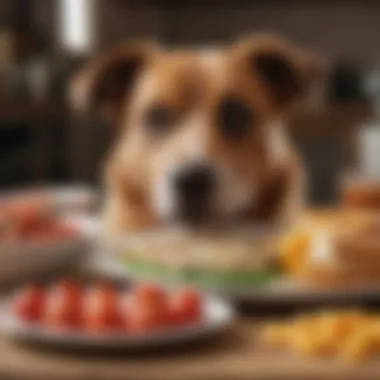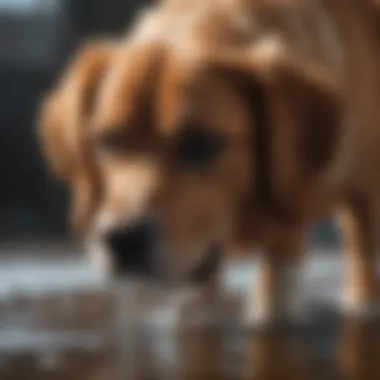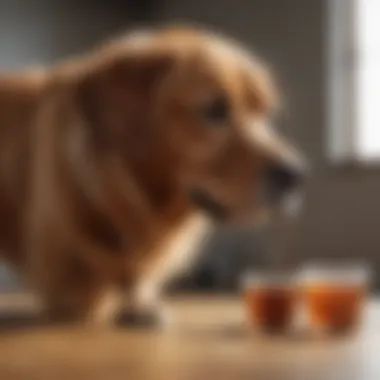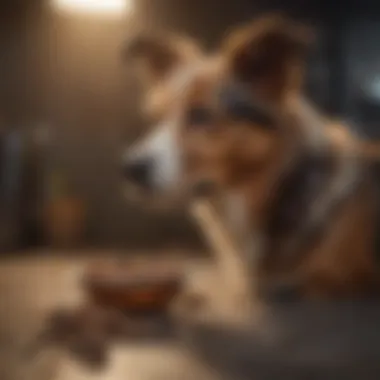Nutrition for Dogs with Diarrhea: A Complete Guide


Intro
Diarrhea in dogs can be distressing for both pet and owner. Understanding how to nourish a dog during this time is crucial for recovery. Nutritional adjustments can significantly aid in alleviating the symptoms and restoring digestive balance. This guide will explore various aspects of dietary management for dogs experiencing diarrhea, offering insight into causes, suitable food options, hydration importance, and when to seek the expertise of a veterinarian.
By providing comprehensive dietary guidance, pet owners can better support their dog's health, fostering an environment that promotes healing and overall wellness.
Animal Profile
General Overview
Dogs, or Canis lupus familiaris, are domesticated mammals that exist in a wide variety of breeds, sizes, and temperaments. They are highly adaptable animals, known for their roles as companions and helpers to humans. Their digestive system is complex, capable of processing various types of food. However, this same complexity can make them susceptible to digestive issues, including diarrhea.
Habitat and Distribution
Home environments and their respective locations vary greatly for dogs. They can be found in urban, suburban, and rural settings across the globe. This distribution is largely due to their close relationship with humans, as dogs have evolved to live alongside people. The geographical spread reflects the diversity of dog breeds, each adapted to specific climates and conditions.
Fascinating Facts
Unique Traits and Adaptations
Dogs possess remarkable adaptations that contribute to their survival and well-being. For instance, their olfactory senses are far superior to those of humans, allowing them to detect various scents that play a vital role in their health and environment. Additionally, dogs exhibit a varied diet, which includes both animal protein and plant-based food. This dietary flexibility equips them to thrive in different circumstances.
Historical and Cultural Significance
Throughout history, dogs have been referred to as
Understanding Canine Diarrhea
Understanding canine diarrhea is the first step in addressing this common health issue. It is essential to recognize that diarrhea can stem from a variety of causes, and knowing these options helps pet owners make informed decisions. This knowledge not only empowers owners but also aids in managing their dog's health effectively during challenging times. Recognizing the factors behind diarrhea and its associated symptoms is a vital aspect of proper canine care.
Common Causes of Diarrhea in Dogs
Several factors can contribute to diarrhea in dogs. Understanding these causes can lead to better preventative measures and quick recovery options.
- Dietary indiscretion: Dogs often eat things they should not. Unfamiliar foods or spoiled items can disrupt their digestive system.
- Infections: Bacterial, viral, or parasitic infections are frequent culprits. These can originate from contaminated water or food sources.
- Food Allergies or Intolerances: Some dogs are sensitive to specific ingredients or formulations in their diet. This can lead to gastrointestinal upset.
- Changes in Diet: Sudden shifts in diet without gradual transition can upset a dog’s stomach.
- Underlying Health Issues: Conditions like pancreatitis or gastrointestinal diseases can also manifest as diarrhea.
Understanding these causes allows for better prevention and response strategies. If a dog is experiencing diarrhea, assessing recent dietary changes or potential infections is important.
Identifying Symptoms and Severity
Identifying the symptoms of diarrhea goes beyond just observing loose stools. Recognizing the severity of diarrhea is crucial for determining the appropriate response.
- Loose or watery stools: This is the primary indicator. Noticing if the diarrhea is ongoing or intermittent is vital.
- Frequency of bowel movements: Frequent episodes within a short time frame signify a more severe issue.
- Accompanying symptoms: Vomiting, lethargy, or signs of discomfort, like excessive whining or pacing, are significant indicators of distress.
- Duration: Diarrhea lasting more than a day often warrants a closer examination.
- Dehydration: Signs of dehydration, such as dry gums or decreased skin elasticity, can occur due to diarrhea.
It is critical to monitor your dog closely during episodes of diarrhea. These observations can assist caregivers in making informed decisions about when to seek veterinary help.
In summary, understanding the causes of diarrhea in dogs and identifying related symptoms are critical. This knowledge serves as a foundation for pet owners seeking effective nutritional and health strategies for their canine companions during episodes of gastrointestinal distress.
The Importance of Diet During Recovery
A dog's diet plays a vital role in its recovery from diarrhea. During this challenging time, selecting the right food can help restore normal digestion and provide essential nutrients. The foods we offer can either promote healing or exacerbate the condition. Thus, understanding the importance of diet during recovery is crucial for pet owners.
When a dog experiences diarrhea, the body loses not only water but also important nutrients. An appropriate diet is necessary to replenish these lost components. Feeding a bland diet often soothes the digestive tract and eases the recovery process. On the other hand, inappropriate foods can lead to longer recovery times or worsen the dog's symptoms.


Moreover, a well-planned diet helps to balance electrolytes that may be lacking due to diarrhea. This balance is crucial as it supports the overall health of the dog, facilitating quicker recovery. Therefore, pet owners should pay close attention to the dietary approach during this period.
How Diet Affects Digestive Health
Diet significantly impacts a dog's digestive health. A quality diet promotes a healthy gut microbiome, which is pivotal in digesting food and absorbing nutrients. During diarrhea, the digestive lining may become inflamed or damaged. A diet that is easy to digest allows the digestive system to rest and recover.
When feeding a dog with diarrhea, it is essential to focus on highly digestible food options. Foods rich in soluble fiber can aid in slow digestion and help firm up loose stools. For example, plain rice or boiled chicken contains easily digestible proteins and carbohydrates. These elements are gentle on the stomach and help stabilize digestion.
Proper nutrition not only aids in recovery but also plays a role in preventing future digestive issues.
Additionally, the presence of probiotics in some dog food can help restore the beneficial bacteria in the gut. This restoration is even more crucial after the use of medications that may disrupt gut flora. Therefore, while a dog's diet is simplified during recovery, it should still be nutrient-rich to support overall health.
Nutritional Needs During Diarrhea
The nutritional needs of a dog experiencing diarrhea are unique. They require specific nutrients to aid recovery while maintaining hydration. Adequate calories are necessary to support energy levels, as diarrhea can be exhausting condition.
Key nutritional points to consider include:
- Hydration: Ensure access to fresh water at all times. Dehydration is a primary concern during diarrhea.
- Electrolytes: Adding electrolyte solutions can replenish lost salts and minerals.
- Proteins: Look for lean proteins that are low in fat. Grilled chicken or turkey can be ideal sources.
- Carbohydrates: Easily digestible carbohydrates, such as white rice and boiled potatoes, can provide energy without stressing the digestive system.
Incorporating these elements can help a dog recover efficiently from diarrhea. While each dog's condition may vary, personalizing their diet based on their specific needs can yield better results. Consult with a veterinarian for tailored recommendations.
Recommended Foods for Dogs with Diarrhea
When a dog experiences diarrhea, selecting appropriate food becomes crucial for recovery. The right diet can help stabilize the digestive system and restore nutrient balance. Implementing recommended foods can alleviate symptoms and promote healing. Each dog may respond differently, making individual assessments important. Below are some suggested foods that can aid your dog's recovery from diarrhea.
Plain Rice and Chicken
Plain rice and chicken are often recommended as the first line of defense against canine diarrhea. This combination is easily digestible, providing essential carbohydrates and protein without overtaxing the digestive system. When preparing this meal, ensure you use skinless chicken and white rice. Avoid adding spices or seasonings as these can irritate the gut further.
- Benefits: This diet is gentle on the stomach, helping to bind stool and reduce symptoms. It supplies essential nutrients without being overly complicated.
- Considerations: Feeding plain rice and chicken should only be a short-term solution. Over time, it may not provide complete nutrition, necessitating a gradual reintroduction of other foods.
Boiled Potatoes
Boiled potatoes can also be beneficial for dogs suffering from diarrhea. They are a good source of carbohydrates and easy to digest. Potatoes should be peeled and boiled without any seasonings. They help provide energy and can help firm up the stool.
- Benefits: Potatoes contain vitamins such as vitamin C and B6, which can support overall health.
- Considerations: Mashed potatoes may be too rich if milk or butter is added. Also, ensure that potatoes are cooked thoroughly, as raw potatoes can be harmful to dogs.
Pumpkin Puree
Pumpkin puree is widely recommended for dog digestive issues, including diarrhea. This natural remedy helps to firm up stool due to its high fiber content. Canned pumpkin (not the spiced pie filling) is convenient and effective.
- Benefits: Fiber is essential for maintaining digestive health. The soluble fiber in pumpkin can absorb excess water in the intestines while providing bulk.
- Considerations: Moderation is key, as too much pumpkin can lead to diarrhea instead of preventing it. Always monitor your dog's response to ensure the right amount.
Electrolyte Solutions
When a dog has diarrhea, dehydration is a significant risk. Electrolyte solutions can play an important role in rehydration. Solutions designed for pets, such as water mixed with Pedialyte, help replace lost electrolytes.
- Benefits: These solutions help maintain proper hydration and replenish essential nutrients like sodium, potassium, and chloride.
- Considerations: Consult your veterinarian before administering any electrolyte solutions to ensure they are appropriate for your dog’s specific needs.
Proper nutrition is a cornerstone of recovery for dogs experiencing diarrhea. Monitoring dietary changes contributes significantly to the healing process.
Foods to Avoid When Dogs Have Diarrhea


Dog owners should focus on the types of foods that could aggravate diarrhea rather than just seeking what to feed. Certain foods can worsen the condition and cause additional distress to an already sensitive digestive system. Identifying and eliminating these foods is crucial for recovery and overall health. Here are specific categories to consider.
Dairy Products
Dairy can be problematic for many dogs. While certain dogs may tolerate small amounts of dairy, many are lactose intolerant. This means their bodies struggle to digest lactose, a sugar found in milk. In cases of diarrhea, introducing dairy can exacerbate symptoms. Symptoms like bloating, gas, and further diarrhea can occur.
Thus, it is advisable to avoid any dairy products, including cheese and yogurt, until the dog's digestive system stabilizes. Consuming dairy during this period may delay recovery and lead to more significant digestive issues.
Fatty Foods
High-fat foods can be hard for dogs to digest under normal circumstances. When experiencing diarrhea, the situation worsens. Fatty foods can cause inflammation in the digestive tract, which is already compromised. This group includes greasy meats, fried foods, or any foods with high oil content.
It's essential to steer clear of these items. Their presence in a dog's diet during diarrhea can lead to additional complications, potentially prolonging the time needed for recovery. Instead, focus on bland, low-fat options to aid in digestion.
Certain Vegetables and Fruits
While some vegetables and fruits are healthy for dogs, others can lead to complications. Onions and garlic, for instance, can be toxic and cause gastrointestinal upset. Moreover, some fruits like grapes and raisins are dangerous and can lead to kidney failure in dogs. Others, like avocados, contain substances that can upset a dog's stomach.
It's crucial to avoid feeding your dog these particular foods during a bout of diarrhea. Favor safe options, such as pumpkin or sweet potatoes, which are known to aid digestion. Careful selection can make all the difference in promoting recovery.
Key takeaway: Avoiding dairy products, fatty foods, and certain harmful vegetables and fruits can help in the swift recovery of dogs suffering from diarrhea.
Hydration: A Critical Component
Hydration is a vital aspect of nutrition for dogs, especially when they are experiencing diarrhea. When a dog has diarrhea, it can lose a significant amount of fluids quickly, leading to dehydration. This is a serious condition that can affect the dog's overall health and prolong the recovery time. Therefore, understanding the role of hydration is crucial for pet owners. Ensuring that your dog stays adequately hydrated can aid in healing and help to stabilize their digestive system.
Signs of Dehydration in Dogs
Identifying the signs of dehydration in dogs is essential. Some common indicators include:
- Dry mouth and gums: The moisture in a healthy dog's mouth and gums should be apparent. A dry mouth can signal dehydration.
- Lethargy: If your dog seems unusually tired or lacks energy, this may be a warning sign.
- Skin elasticity: When you gently pinch the skin on the back of your dog's neck, it should spring back quickly. If the skin stays lifted, it may indicate dehydration.
- Sunken eyes: A dog with signs of dehydration may have eyes that appear sunken or dull.
- Increased thirst: If your dog is drinking more water than usual, this may be a signal that it is dehydrated.
Recognizing these symptoms early can help you take appropriate action to provide necessary hydration.
How to Keep Your Dog Hydrated
Keeping your dog hydrated involves several simple strategies:
- Provide fresh water: Always ensure your dog has access to clean, fresh water. Change the water regularly to encourage drinking.
- Moisten food: If your dog has a decreased appetite, you can mix water into their food to enhance moisture content.
- Electrolyte solutions: Consider offering veterinary-approved electrolyte solutions. These can help replenish lost fluids and electrolytes, particularly during bouts of diarrhea.
- Offer ice chips: Some dogs prefer to lick ice chips instead of drinking water. This can be a fun way to keep them hydrated.
- Monitor water intake: Keep track of how much water your dog is drinking. If intake is lower than usual, it is essential to intervene.
It is important to know that severe dehydration may require veterinary intervention, where intravenous fluids might be needed to stabilize the dog.
Gradually Reintroducing Regular Food
Reintroducing regular food for a dog recovering from diarrhea is essential. It helps restore a balanced diet without overwhelming the dog's digestive system. This transition must be handled carefully to avoid any setbacks or further digestive issues. A gradual approach allows the dog's system to readjust to its normal food while monitoring for any adverse reactions.
When to Start Reintroducing Regular Diet
Timing is crucial in reintroducing the regular diet. Generally, it is advisable to wait until the dog has had at least 24 to 48 hours of normal bowel movements before considering the shift back to regular food. Signs that the dog is ready include:
- No diarrhea or loose stools.
- Normal energy levels.
- An interest in food.
One should not rush this process. A sudden introduction of the regular diet might trigger a recurrence of diarrhea, putting additional stress on the dog's digestive system.


How to Transition Back to Normal Food
The transition back to a regular diet should unfold over several days. Here are some steps that can guide the process:
- Start with Small Portions: Begin by mixing a small amount of the regular food with the bland diet. This proportion can be roughly 25% regular food to 75% bland food.
- Incrementally Increase Regular Food: Every two days, increase the amount of regular food while decreasing the bland diet. The goal is to reach a 100% regular diet after about a week.
- Monitor for Any Symptoms: During this transition, keep an eye on the dog's stools. Any signs of diarrhea or distress should prompt a return to the bland diet until the situation stabilizes.
- Consider Individual Needs: Every dog has unique needs and tolerances. Consult with a veterinarian if uncertain about any step in the process.
“Gradual transitions can significantly minimize digestive upset in recovering dogs.”
Increasing the regular food too quickly can lead to setbacks. Being attentive to the dog's reactions is vital. A successful transition leads not only to improved digestive health but also to overall well-being.
When to Consult a Veterinarian
Consulting a veterinarian is a critical step in the management and treatment of canine diarrhea. While many cases can be addressed through dietary adjustments and hydration, certain signs indicate a need for professional evaluation. Recognizing when to seek veterinary assistance can prevent complications and ensure the well-being of your pet.
Identifying the right moment to take your dog to a vet involves weighing several factors. Understanding that diarrhea is often a symptom rather than a standalone issue emphasizes the need for thorough observation. Persistent or severe cases may not resolve with basic home care, necessitating expert intervention.
Persistent Symptoms
Persistent symptoms are a primary reason to consult a veterinarian. If your dog’s diarrhea lasts more than 24 hours, this could signal a more serious underlying issue. Common causes of prolonged diarrhea include:
- Infections (bacterial, viral, or parasitic)
- Chronic diseases affecting the gastrointestinal system
- Dietary intolerances or allergies
- Cancer
Ignoring these warning signs may result in further complications. Your veterinarian can provide diagnostic testing to ascertain the specific cause and recommend appropriate treatment.
When assessing these symptoms, consider the frequency of bowel movements and the consistency of the stool. If diarrhea is accompanied by blood or mucous, the urgency of veterinary consultation increases dramatically.
Consult a vet if diarrhea persists beyond 24 hours, as this may indicate a serious problem.
Additional Symptoms of Concern
Identifying additional symptoms is equally significant in deciding to consult a veterinarian. Symptoms such as vomiting, lethargy, or loss of appetite further complicate the situation. Each of these signs can indicate various serious conditions, including:
- Gastroenteritis
- Pancreatitis
- Liver disease
- Kidney issues
If your dog exhibits any combination of these symptoms, it is prudent to seek professional help immediately. Furthermore, signs of dehydration, such as excessive thirst, dry gums, or skin that does not spring back when pinched, are crucial indicators that warrant a veterinary visit.
At times, even minor symptoms, when combined with diarrhea, can provide crucial information. Early intervention can often lead to better outcomes. Thus, keeping a close eye on your dog's overall health and behavior can make all the difference.
Preventative Measures to Avoid Future Diarrhea
Preventing diarrhea in dogs is crucial for maintaining their overall health and well-being. Diarrhea can lead to dehydration and other serious health issues, especially in young or elderly pets. By implementing appropriate preventative measures, pet owners can reduce the risk of future episodes and ensure that their canine companions remain healthy. This section will explore vital steps, benefits, and considerations regarding prevention.
Maintaining a Consistent Diet
A stable and consistent diet is one of the key factors in preventing diarrhea in dogs. Changes in diet can disrupt the digestive system, possibly resulting in gastrointestinal issues.
Key Points
- Select Quality Dog Food: Choose a reliable brand that meets nutritional standards. Foods should contain balanced proteins, carbohydrates, and fats.
- Avoid Sudden Changes: When transitioning to a new food, do it gradually to allow your dog's stomach to adapt. Mix small portions of the new food with the old one over several days.
- Monitor Treats: Treats should complement the main diet and not disrupt their digestive health. Avoid giving many new or rich treats at once.
Maintaining this consistency helps the digestive system function properly, reducing the likelihood of diarrhea.
Regular Veterinary Check-ups
Frequent veterinary visits are fundamental in ensuring your dog's health. Regular check-ups can help identify potential issues before they develop further.
Importance of Check-ups
- Early Detection: Routine exams allow veterinarians to catch signs of dietary intolerances, infections, or any health risks early.
- Vaccinations: Staying up-to-date on vaccinations can prevent illnesses, some of which can lead to diarrhea.
- Parasite Control: Regular screenings for parasites ensure that intestinal worms or other parasites are treated before they cause digestive upset.
By maintaining regular appointments with a veterinarian, pet owners can actively participate in their dog's health management and reduce incidents of diarrhea effectively.















